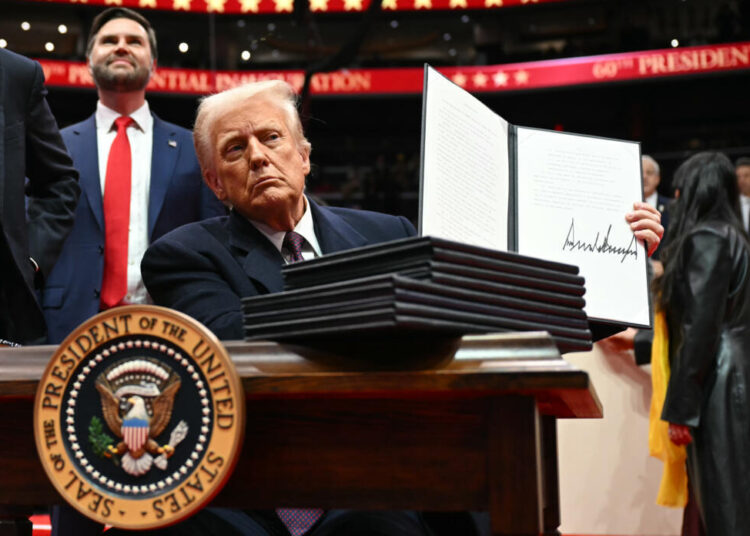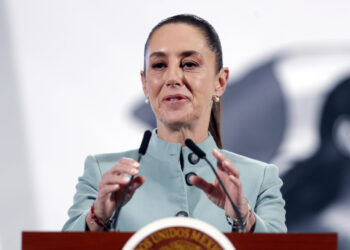An executive order is an official document signed through which the president manages the operations of the Federal Government, orders a federal official or administrative agency to take action ― or refrain from doing so.
Technically speaking, it is enforceable as long as it is within the president’s constitutional authority. Congress has the power to override an executive order by passing legislation that invalidates it. The courts can also slow down or stop them.
Between January 20, when he took office, and February 12, Trump signed more than 65 executive orders (42 of them on the first day, in front of a massive audience): the largest number that a president has launched in the first hundred days of his term, in more than forty years. Among the most important are the following:
Immigration
- Stopping the arrival of refugees and suspending the U.S. Refugee Admissions Program as of January 27, 2025.
- Redefining birthright citizenship under the 14th Amendment. Under the proposed redefinition, a child born in the United States is not a citizen if: a) the mother does not have legal immigration status or is in the country legally but only temporarily; and, b) the father is not a U.S. citizen or legal permanent resident. The order prohibits U.S. agencies from issuing any document recognizing a child as a citizen or accepting any state document that recognizes citizenship.
- Prioritizing the continued construction of a “wall” and “other barriers” along the U.S.-Mexico border.
- Ending the Parole Program, which allows citizens of Cuba, Haiti, Nicaragua, and Venezuela to enter the United States.
- Prioritizing resettlement of South Africans of European descent through the U.S. refugee program, which Trump suspended on his first day in office. (He accused the South African government of discriminating against Afrikaners, who first settled there in the 17th century.)
- Requiring a review of the cases of all immigrants who are in the United States under Temporary Protected Status, with the intent to “ensure that such designations are appropriately limited in scope” and last the minimum time “necessary to meet the textual requirement” of federal law.
- Ordering the Secretary of State and U.S. diplomats to impose sanctions on any nation unwilling to accept and facilitate the return of people the United States deports.
- Ordering the attorney general to deny federal money to sanctuary cities that the administration deems to be interfering with the enforcement of federal immigration laws.
- Suspending the granting of federal money to non-governmental organizations “that support or provide services, directly or indirectly, to deportable or illegal aliens” pending reviews and audits to identify any operations that may “promote or facilitate violations of our immigration laws.”
Domestic Policy
- Establishing the Department of Government Efficiency under the Executive Office of the President until July 4, 2026. This is the entity run by Elon Musk, the richest man in the world, charged with implementing cuts in federal programs and spending.
- Facilitating the firing of federal employees by reinstating an executive order from the first Trump administration, repealed under Biden. Provisions are added stating that federal employees and applicants “are not required to personally or politically support the current president,” but must “faithfully implement the administration’s policies,” understanding that “failure to do so is grounds for dismissal.”
- Repealing Biden’s COVID-19 orders and directives.
- Eliminating Biden administration emissions standards that benefited electric vehicles. Reviewing any actions that could hinder domestic energy production.
- Commuting the sentences and granting pardons to hundreds of people convicted for their role in the January 6, 2021, attacks on the U.S. Capitol.
- Ordering the attorney general to review investigative and enforcement actions by all agencies during Biden’s term in office to identify what the president describes as “the weaponization of the federal government” against his supporters. The directive identifies the Department of Justice, the Federal Trade Commission, the Securities and Exchange Commission, and the intelligence community. It requires a report to the president on the findings with recommended “corrective actions.”
- Revoking the security clearances of 50 people Trump accuses of helping Biden’s 2020 campaign. The list includes former top intelligence officials James Clapper, Michael Hayden, and Leon Panetta, along with Trump’s former national security adviser John Bolton. And President Biden himself.
- Ordering the director of national intelligence and the director of the CIA to submit a report within 90 days with recommendations for additional “disciplinary measures” and how to “prevent the intelligence community or anyone working for or within it from inappropriately influencing national elections.”
- Recognizing two genders at the federal level, eliminating diversity and inclusion initiatives. Ordering federal agencies to use the term “sex,” not “gender,” and to ensure that federal personnel records and government-issued documents such as passports “accurately reflect the sex of the holder.”
- Ordering agencies to ensure that federal funds “do not promote gender ideology.”
- Prohibiting federal funds from being used for sex reassignment health care in prisons and mandating “privacy in intimate spaces” to ensure single-sex spaces are designated by sex and not gender identity.
- Withdrawing the United States from international sports programs that allow transgender women to participate. Ordering the Secretaries of State and Homeland Security to work to ban transgender athletes from entering the country.
- Defunding schools and other educational agencies that require COVID-19 vaccines for students and staff. Ordering Health and Human Services Secretary Robert F. Kennedy Jr. and the head of the Department of Education to create a plan to end federal funding to entities that do not comply.
- Ordering the Secretary of State to “use all appropriate and available measures” to “ensure that the International Olympic Committee adjusts its rules on women’s sports participation.”
- Restoring the name of Mount McKinley in Alaska. The change recognizes William McKinley, the 25th president of the United States, whom Trump has praised for his economic leadership and expansion of American territory during the late 19th century. In 2015, President Barack Obama renamed the mountain Denali, the name historically given to it by native tribes.
- Changing the name of the Gulf of Mexico to the “Gulf of America” (United States). “America will reclaim its rightful place as the greatest, most powerful, and most respected nation on Earth by inspiring awe and admiration around the world,” Trump said in his inaugural address. “Before long, we will change the name of the Gulf of Mexico to the Gulf of America.”
- Declassifying records and documents on the assassinations of President John F. Kennedy, Senator Robert F. Kennedy, and the Rev. Dr. Martin Luther King Jr.
- Ordering all executive agencies to adopt policies to reduce consumer prices.
Foreign Policy
- Exiting the Paris Agreement, arguing that it harms the U.S. economy.
- Designating international cartels “Foreign Terrorist Organizations” or “Specially Designated Global Terrorists.”
- Redesignating Yemen’s Houthis a terrorist organization.
- Canceling Biden’s sanctions on far-right Israeli groups and individuals accused of violence against Palestinians in the West Bank.
- Ordering the Secretary of State to issue a guide to bring all State Department policy, programs, personnel, and operations in line with an “America First” foreign policy.
- Suspending all foreign development aid pending reviews of “efficiencies and consistency” with administration goals.
- Withdrawing the United States from the World Health Organization (WHO). Ordering the White House Office of Management and Budget to halt future transfers of U.S. money to the WHO.
- Applying a 25% tariff on imports from Canada, and a 10% levy on oil, natural gas, electricity, and other energy products. Mexican imports would face an additional 25% tax, and imports from China would face an additional 10% tariff.
- Sanctioning officials at the International Criminal Court (ICC), alleging that they have engaged in “unlawful and baseless actions against the United States and our close ally Israel.” Imposing financial sanctions and visa restrictions on ICC officials and their family members.
***
This style of hyperventilating executive power has faced multiple responses from legal and civil society organizations.
So far, judges have blocked Trump’s orders to end birthright citizenship, freeze trillions of dollars in federal spending, and allow Elon Musk’s “government efficiency” effort to access government pay data. But dozens of lawsuits challenging other executive actions are pending.
In early February, a federal judge in Rhode Island found that the Trump administration had continued to freeze federal funds, despite a temporary restraining order issued earlier by the same judge. In a five-page document, Judge John McConnell Jr. found that the administration had, in several instances, continued to “improperly freeze federal funds and refuse to resume the disbursement of those federal funds.”
The ruling was a response to a lawsuit filed by the attorneys general of 22 states and the District of Columbia. In his decision, the judge ordered the administration to “immediately restore the frozen funds” and “immediately end any pause in federal funding” affecting the plaintiffs. A second federal judge spoke along similar lines. But they kept doing so.
Amid these circumstances, Vice President JD Vance declared that judges “cannot check the legitimate power of the executive.” And he went further in his advice to the president: “Fire all the mid-level bureaucrats, all the civil servants in the administrative state, and replace them with our people.”
For their part, advocacy groups and state officials, not necessarily Democrats, argue that Trump poses a threat to the rule of law and the system of checks and balances that are supposed to restrict the powers of government.
The issue raises the question of what judges can do if Trump defies them. They have no ability to take action against a president who enjoys broad immunity for official actions, especially after a Supreme Court ruling last year.
But they can use some tools against Trump officials and their government agencies. They can, for example, find officials or their lawyers guilty and fine them for contempt. And impose financial penalties for noncompliance. And, in extreme cases, jail them for that same contempt, among other possible measures.
It is not simply that the new administration has violated a series of federal statutes and triggered an avalanche of legal challenges; some of Trump’s top advisers (not just his vice president) have cast doubt on whether decisions on those lawsuits can constrain the president.
Everything points to a constitutional crisis, the result of the president’s failure to comply with laws and judicial rulings. As a law professor at the University of California, Berkeley, put it: “We are in the midst of a constitutional crisis…. There have been too many unconstitutional and illegal actions in the first 18 days of the Trump presidency. We have never seen anything like this.”
One of Donald Trump’s latest posts, reminiscent of Napoleon, is categorical and conclusive in this regard. He issued it on Presidents’ Day, February 17: “He who saves his country does not violate any law…”







